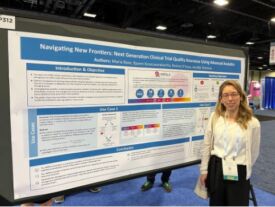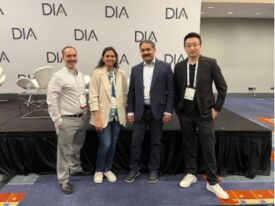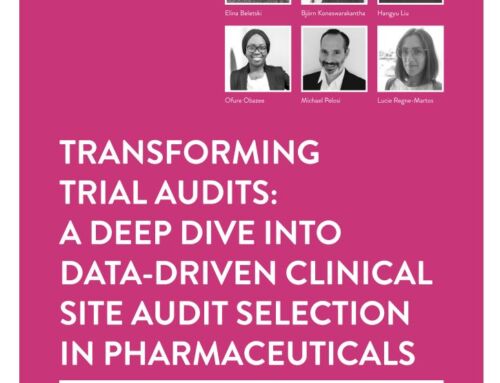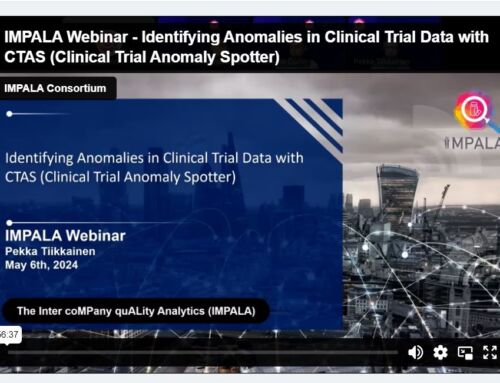IMPALA Consortium at DIA 2025
The Drug Information Association (DIA) Global Annual Meeting held in Washington, DC from June 15-19, 2025, brought together pharma industry pioneers, regulatory experts, and healthcare visionaries. The IMPALA (Inter coMPany quALity Analytics) consortium had a great delegation of members that presented at 4 sessions and a poster showcasing some of the work we are focusing on and leading discussions on the application of digital and advanced analytic methodologies. It also provided an opportunity for the group to connect in person over some good food and share reflections and ideas for the future. Below is a brief summary of the sessions where IMPALA members presented.


Session #130: Innovation at the Intersection: Clinical Operations, Data Management, and Quality Assurance on Quality-by-Design and Risk-Based Quality Management
This session was chaired by Michael Torok from Genentech, a member of the Roche Group. The session featured three speakers: Emily Gebbia from FDA/CDER, Michael Torok from Genentech, and Kevin Richards from AstraZeneca. Emily Gebbia discussed quality from a regulator’s perspective, emphasizing fit-for-purpose quality, shared responsibilities, data reliability, and the importance of critical thinking in clinical trials. Michael Torok advocated for a paradigm shift in implementing quality, promoting a “one team” QbD mindset, breaking down silos, and aligning on the understanding of oversight, risk, and issues. Kevin Richards highlighted the need for holistic digital transformation beyond just AI, focusing on converting documents into data, automating study inspection readiness, tracking study milestones, categorizing quality events, automating informed consent processes, and predicting site inspections.


Session #328: Artificial Intelligence in the Medicines Lifecycle: Delivering Globally for Public and Animal Health
This session was chaired by Luis Pinheiro from the EMA. The session featured speakers from Roche, Swissmedic, FDA, and MHRA, who discussed various aspects of AI in drug development and regulation. Key themes included the alignment of AI guidelines with GxP regulations and AI ethics principles like “human in the loop,” transparency, and explainability. Speakers highlighted the need for regulation to address AI agents and focus on practical use cases. Swissmedic presented examples of AI tools used at their agency, built on a secure cloud-based platform shared by multiple EU regulatory agencies. FDA acknowledged that AI’s pace outstrips the rate of new molecular entity approvals (Eroom’s Law) and discussed the complexities of unharmonized regulations and data privacy, outlining areas of focus for harmonization. MHRA shared their focus on utilizing AI and automation throughout the clinical trial lifecycle, in post-market surveillance, and for answering scientific queries, also mentioning their initiatives like the AI Airlock and efforts to reduce clinical trial burden.
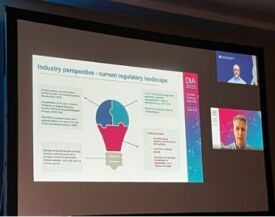

Session #363: Critical to Quality Assessment Report (CAR) from Inception to Operationalization: How to Engage Internal Stakeholders
This session was chaired by Kieran Trevett (Genentech/Roche Group), emphasizing CARs as a tool to supplement GCP inspections and provide transparency. The process involves CtQ-based risk assessment, a Quality Assurance Strategy, and Evidence Generation leading to Quality conclusions that are summarised in the CAR. Cheryl Grandinetti (FDA) highlighted the importance of Quality by Design (QbD) and risk proportionality, stressing that QbD fosters transparency and builds trust with regulators. Jennifer Emerson (Boehringer Ingelheim) discussed the evolving role of quality professionals, who will need to embrace data analytics and digital tools. Mandy Kaur Budwal-Jagait (MHRA) noted that while MHRA conducts risk-based inspections focusing on participant safety and reliability of results, CARs can be helpful in understanding how CtQs were managed, complementing but not replacing the Clinical Study Report (CSR). The overall consensus was that CARs promote a proactive, one-organization approach to quality, enhance collaboration, and build trust with regulators.
Session #404: Embedding and Leveraging AI for Quality and Compliance in Pharma
This session was chaired by Hangyu (Cedric) Liu of Biogen, who highlighted the transformative potential of AI in biopharmaceutical quality. The Inter-company quality analytics consortium (IMPALA) was discussed, focusing on using AI for classification, data extraction, insight generation, and recommender solutions. Roshan D’Souza from Roche presented three use cases: assessing the impact of regulation changes on SOPs, identifying reportable events in product complaints using Generative AI, and a forthcoming project on generating audit report drafts. Meera Nagaria of J&J emphasized the importance of explainability in NLP models and shared approaches on how this can be implemented and its value. Mike Pelosi from Astellas discussed essential skills for quality professionals in the AI era, including domain expertise, digital literacy, AI knowledge, prompt engineering, and soft skills, while also addressing challenges like ethical and regulatory considerations. The session underscored that AI optimizes and enhances quality oversight, but still requires critical thinking and subject matter expertise.
Poster – Navigating New Frontiers: Next Generation Clinical Trial Quality Assurance Using Advanced Analytics
This poster, presented at the DIA Conference by IMPALA members from Boehringer Ingelheim and Roche, demonstrated how advanced analytics can transform traditional quality assurance in clinical trials. It highlighted the shift from reactive to proactive approaches in managing quality, utilizing data-driven insights to improve efficiency and patient safety. The poster presented case studies demonstrating the benefits of advanced analytics, including enhanced quality management and improved risk assessment, ultimately showcasing a new paradigm for quality assurance in clinical development.
